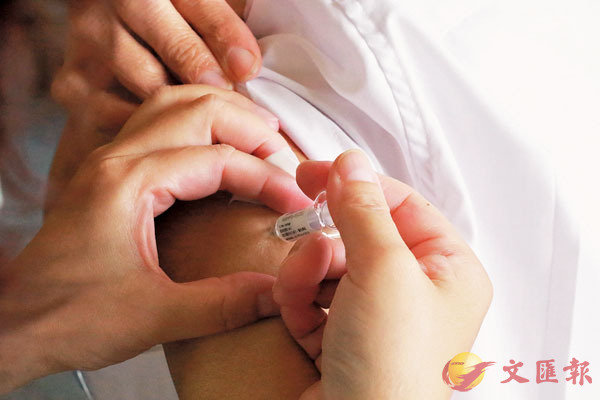 ■預計明年底全球將有超過11億人可望接種疫苗。 資料圖片
■預計明年底全球將有超過11億人可望接種疫苗。 資料圖片【原文】下文摘錄自香港《文匯報》11月18日︰
美國兩家藥廠(pharmaceutical company)近日相繼宣布新冠病毒(COVID-19)疫苗第三階段臨床試驗成功,為全球控制疫情帶來希望,由於兩家藥廠合共預計到明年可以生產超過20億劑疫苗,按每次接種需要兩劑計算,意味到明年底全球將有超過11億人可望接種疫苗。與輝瑞(Pfizer)合作研發疫苗的生物科技公司BioNTech特別提醒,疫苗研發工作並非「勝者全得制」(the winner takes it all),而是需要不同藥廠合作,才能讓社會群體免疫(herd immunity)。
輝瑞與BioNTech合作研發的新冠疫苗保護(efficacy rate )率逾90%,另一美國藥廠Moderna的疫苗更可提供近95%保護率,是最有望正式推出市面的兩款疫苗。據Moderna所指,公司可在明年底生產10億劑疫苗,輝瑞在同一時間表下則可生產13億劑,由於兩款疫苗都需接種者打兩針,折合便可讓約11.5億人接受接種;目前美國、日本(Japan)、加拿大(Canada)、瑞士(Switzerland)、卡塔爾(Qatar)、以色列(Israel)及歐盟(European Union),都已經與Moderna簽約購買疫苗。
Moderna稱公司已與英國政府簽署協議,一旦獲得當地監管機構(regulatory authority)批准,將於明年3月開始向英國供應疫苗,但Moderna未披露協議內容,包括供應劑量等。Moderna行政總裁班塞爾(Stephane Bancel)昨日警告,歐洲國家若在採購新冠疫苗的談判上拖拖拉拉,將較遲獲分發,其他已簽約的國家可優先獲發疫苗。
BioNTech的行政總裁沙辛(Ugur Sahin)接受訪問時,表明各藥廠並非競爭對手(competitor),而是共同為同一目標努力,讓社會在明年實現群體免疫。他預計明年初會有最少一款疫苗獲准使用,故應在明年的前6至8個月盡量讓民眾打針,如此在冬季便無須再封城(lockdown)。法國(France)昨日便公布,在疫苗獲歐盟批准使用後,目標1月開始讓民眾打針,不過更大問題在於民眾是否願意接種。
輝瑞與BioNTech研發疫苗需以攝氏零下70度的極低溫儲存,令分配運送存在重大挑戰。輝瑞前日宣布啟動小型配送試驗計劃,為美國羅得島(Rhode Island)、得州(Texas)、新墨西哥州(New Mexico)和田納西州(Tennessee)先行配送疫苗,希望能為美國其他州份以至其他國家提供參考,確保疫苗送達後仍然有效。
輝瑞表示,選擇這4州是基於它們的總面積、人口分布、接種疫苗設備均有所不同,同時亦可測試在市區及鄉郊配送疫苗的方法,但輝瑞強調,在進行配送測試的州份,居民不會較其他州份的人更早接種疫苗。
白宮(White House)傳染病(infectious disease)專家福奇(Dr. Anthony Fauci)受訪時,則對疫苗測試結果表示鼓舞,認為超出所有人的預期。輝瑞和Moderna均使用新的信使核糖核酸(messenger ribonucleic acid, mRNA)技術研發疫苗,mRNA能入侵人體細胞,激發免疫系統(immune system)對抗病毒,由於利用這項技術研發的疫苗尚未獲審批,有人對mRNA技術抱懷疑態度,福奇指出,「對於未曾嘗試過的東西,人們往往有所保留(reservation),但既然已有兩款疫苗被證實有90%以上的效力,數據已可證明一切。」
Over 1.1 billion people worldwide can receive vaccination next year
【譯文】Two U.S. pharmaceutical companies had recently announced the success in the phase 3 clinical trial of COVID-19 vaccines, delivering hope to help bring the global pandemic under control. As the two companies would be able to produce more than 2 billion doses of vaccine by next year, given that the vaccine is set to administered in two doses, it is expected that over 1.1 billion people worldwide can be vaccinated by end of next year. BioNTech, a biotechnology company that developed the vaccine in cooperation with Pfizer, specifically reminded that the work of vaccine research and development was not about "the winner takes it all", rather, cooperation between various drug manufacturers was crucial towards the achievement of herd immunity.
The COVID-19 vaccine co-developed by Pfizer and BioNTech was claimed to have achieved an efficacy rate of over 90%, while that of another U.S. drug manufacturer Moderna even reached nearly 95%, with both being expected to be officially launched on the market shortly. According to Moderna, the company would be able to produce 1 billion doses of vaccine by end of next year, while Pfizer could produce 1.3 billion doses under the same schedule. Since both vaccines would require two doses, it is estimated that roughly 1.15 billion people would stand a chance to receive the vaccination. Currently, the U.S., Japan, Canada, Switzerland, Qatar, Israel and the European Union (EU) had all signed supply contracts with Moderna to purchase the vaccines.
Moderna said that the company had signed an agreement with the U.K. government that it would start supplying vaccines to the country in March next year upon approval by the relevant regulatory authorities, but details of the agreement, including the number of doses to be supplied, were not disclosed yet. Moderna's Chief Executive Officer Stephane Bancel warned European countries that dragging out negotiations to buy the company's vaccines might slow down deliveries, as other nations that had signed the deals would be given priority to get the vaccines.
BioNTech's Chief Executive Officer Ugur Sahin said in an interview previously that producers were not competitors but rather were working together towards a common goal of immunizing as many people as possible next year. He predicted successful approval for at least one shot at the beginning of next year and called for a vaccination push in the first six to eight months of 2021 to avoid more lockdowns next winter. France announced recently that it was preparing to kick off a nationwide COVID-19 vaccination campaign in January after the vaccine was approved for use by the EU, but it might hinge on the willingness of people to receive the vaccines.
The vaccine co-developed by Pfizer and BioNTech needs to be stored at -70 degrees Celsius, making delivery and transportation a major challenge. Pfizer announced the launch of a small-scale vaccine distribution pilot program to deliver vaccines to Rhode Island, Texas, New Mexico and Tennessee, hoping that the pilot program would serve as a model for other U.S. states and international governments as they strived to implement effective vaccine programs.
Pfizer said that the four states were selected because of their differences in overall size, diversity of populations, and immunization infrastructure, as well as the states' need to reach individuals in varied urban and rural settings. Yet, the company stressed that residents in the four states included in this pilot program would not receive vaccine doses earlier than other states.
The White House infectious disease scientist Dr. Anthony Fauci described the trial result as "stunningly impressive", believing that it exceeded everyone's expectations. Both Pfizer and Moderna had used the new messenger ribonucleic acid (mRNA) technology to develop vaccines, which would directly hack into human cells and stimulate the immune system to fight viruses. Given that vaccines developed using this technology had yet to be approved and some people were skeptical of such technology, Fauci pointed out that "there were many people who had reservations about using something that had not been tried before, but when you have two vaccines that have proven to be greater than 90% effective, it's established itself with solid figures."■龐嘉儀
Q&A
1. Moderna的總部在哪裏?
2. Moderna的創辦人是誰?
3. Moderna獲美國政府發起什麼計劃以資助疫苗研發工作?
4. 據悉Moderna的疫苗需儲存於多少溫度的環境?
5. 全球至今最少有多少款新冠疫苗已進入最後測試階段?
Answer
1. 美國麻省(Massachusetts)
2. 幹細胞(stem cell)生物學家Derrick Rossi
3. 「曲速行動」(Operation Warp Speed)
4. 2℃至8℃
5. 11款

